By ERICK CORDERO GIORGANA, BETHANY MARCUM, AND CARMELA WARFIELD
The first regular session of the 33rd legislature adjourned on May 17, with a one-day special session on May 18.
Thirty-one bills were passed by both bodies, and as of this writing, one was vetoed and three were signed into law.
The first expedited the appropriation of state and federal funds to address backlogs in public assistance processing, including Supplemental Nutrition Assistance Program benefits.
The second bill allows for the development of carbon offset projects and carbon management initiatives on state lands, and is intended to create new private sector jobs and new revenue sources for the state.
The third repeals future sunset dates for the Renewable Energy Fund, a grant program established by the legislature in 2008 to support the development of renewable energy projects in Alaska.
As for the remaining 27 bills passed in 2023, readers should remember that the governor maintains veto authority and nothing is final until signed (or passed without signature) into law.
The total number of bills passed during this first year of the two-year legislature is comparable to numbers passed in the first year of other recent legislatures.
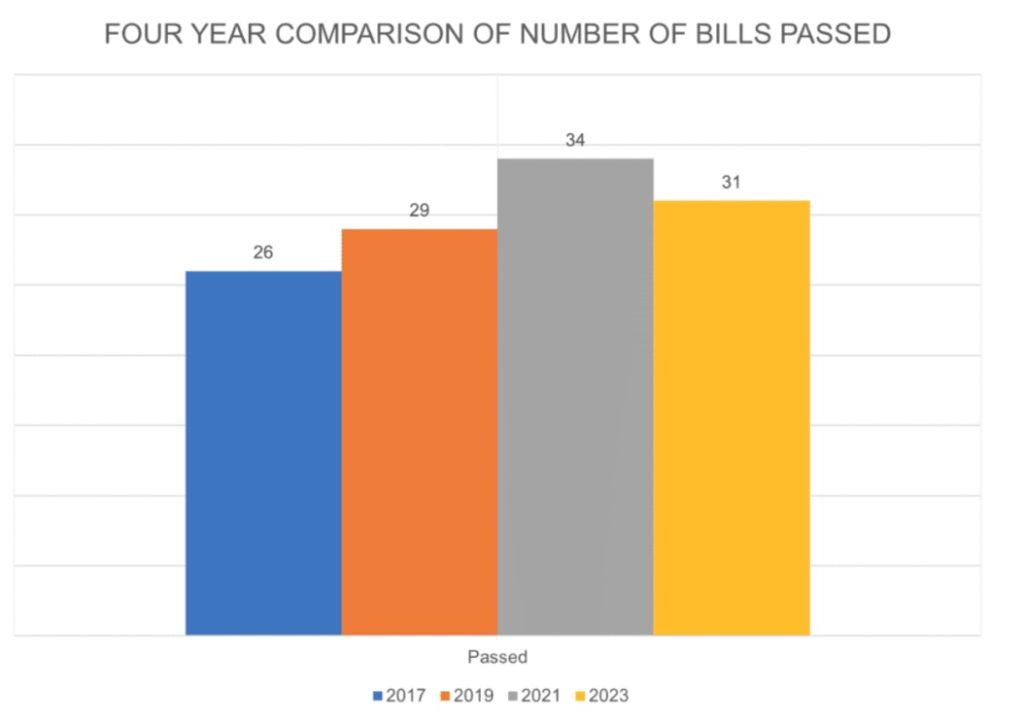
Legislators made positive progress towards increasing opportunities for economic prosperity in our great state by passing a bill that repealed the requirement that applicants for an Alaska Commercial Driver’s License to hold a regular Alaska driver’s license for at least one year before they can begin the process of obtaining a CDL. Given that comprehensive, federal-required safety and training standards are in place for obtaining a CDL, this bill removed a redundant barrier to workforce development.
On the health care front, there was progress but no resolution on direct health care, an important free market reform. The Senate passed a rather distorted version of a direct health care bill but the House did not vote on it. The other significant health care policy, certificate of need repeal, didn’t make notable headway.
Over 20 bills related to taxation were introduced, mostly to create new or increase current taxes. Alaskans will be relieved to know that none passed – yet. But all are still in play for a potential special session and for when the Legislature reconvenes in January 2024.
An outstanding bright spot was the passage of a bill that prevents state and municipal governments from closing gun stores and shooting ranges during disaster emergency declarations while other retailers remained open. This would be enforced statewide and give Alaskans peace of mind that they can defend themselves and provide for their families and communities, especially during unprecedented times of emergency.
Alaska Policy Forum was discouraged to see the outcome of the special session vote on the most important task of the legislature, the Fiscal Year 2024 budget. The legislature irresponsibly authorized spending of $8.06 billion in state funds, which is almost 10% more than last year’s state-funds budget, and 4.5% more than our Responsible Alaska Budget recommendation.
Part of that appropriation includes the largest ever one-time increase in education funding—a blank check of new money for school districts which are still sitting on millions of dollars in federal Covid-related funding, and which have no accountability in place for Alaska’s last-in-the-nation academic outcomes.
Even so, this was preferable to a bill aimed at increasing the annual base student allocation. Although amendments to the bill were offered to direct the increased education funding to teachers and classroom instruction, and to improved student outcomes, these amendments were not adopted.
We have written extensively on the critical need to improve student learning outcomes statewide. We strongly encourage legislators who want funding increases to include policies that give teachers the support they need to implement improvements and early literacy laws effectively, and to require improved learning outcomes for Alaska’s children.
There is some good fiscal news: the budget won’t be hit this year with hundreds of millions of dollars more in defined benefits pension costs—those bills received an immense amount of attention but none passed—yet.
Election policy is certainly in the news, but not so much in Juneau. With over 30 election-related bills filed, including three which would repeal ranked-choice voting, it was expected there would be hearty consideration. Unfortunately, there was very little activity on these bills.
While introducing and passing legislation is not necessarily an indication of a policymaker’s effectiveness, we thought it would be interesting to look at the data.
Overall in 2023, 361 bills were introduced; individual legislators introduced 265, while committees introduced 96. A total of 31 bills passed both chambers. Many of the committee bills that passed were requested by the governor (Note: our analysis reflects only actual bills, not resolutions).
Number of Bills Passed by Individual Legislators
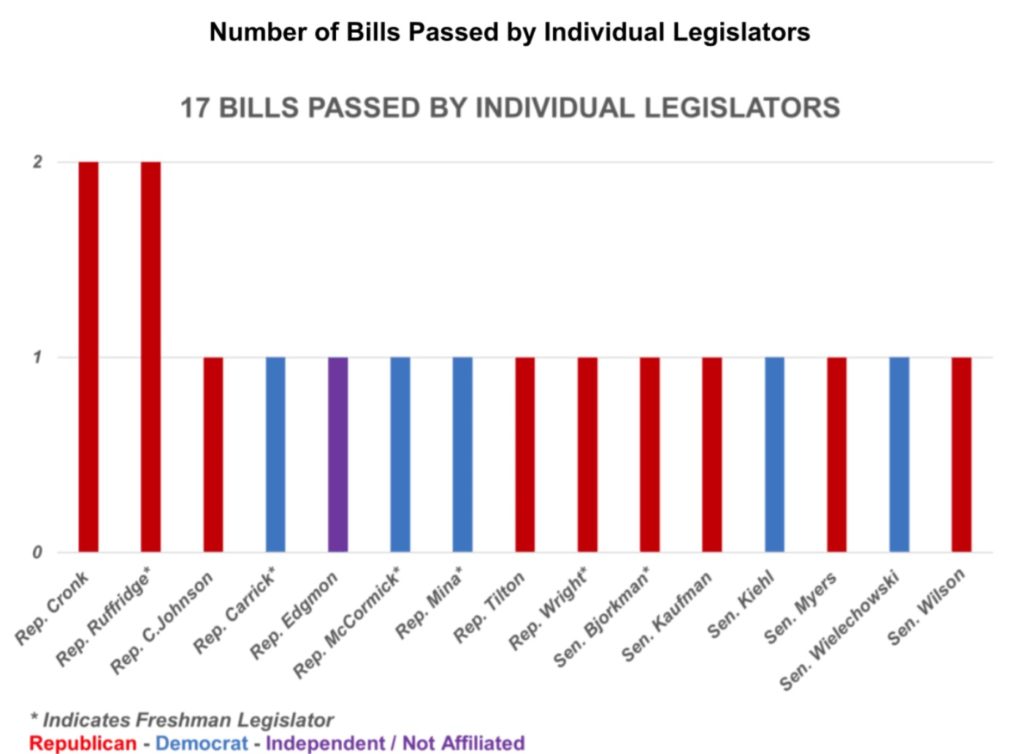
Number of Bills Passed by Committees
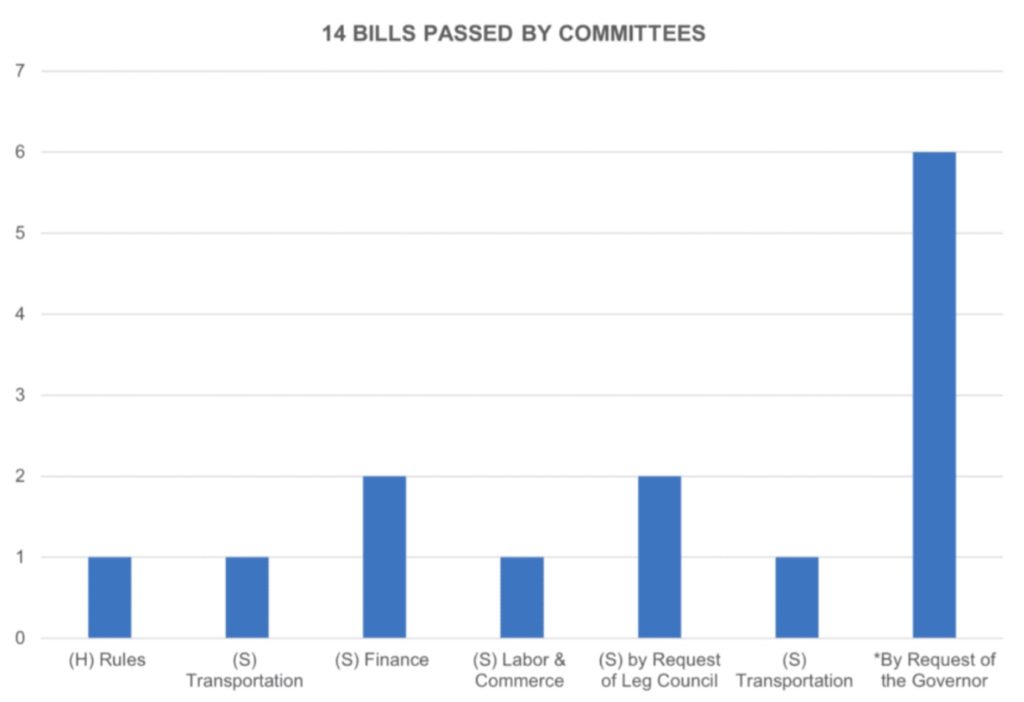
Here are a few data highlights:
- Legislators who introduced 10 or more bills:
- Representative George Rauscher (R): 14
- Senator Cathy Giessel (R): 11
- Representative Andy Josephson (D): 10
- Senator Scott Kawasaki (D): 10
- Representative Stanley Wright (R): 10
- Legislators with the most bills passed:
- Representative Mike Cronk (R): 2
- Representative Justin Ruffridge (R): 2
- Legislators who did not introduce bills:
- Senator Bert Stedman (R)
- Representative Josiah Patkotak (I)
- Freshmen introduced 30% of all bills
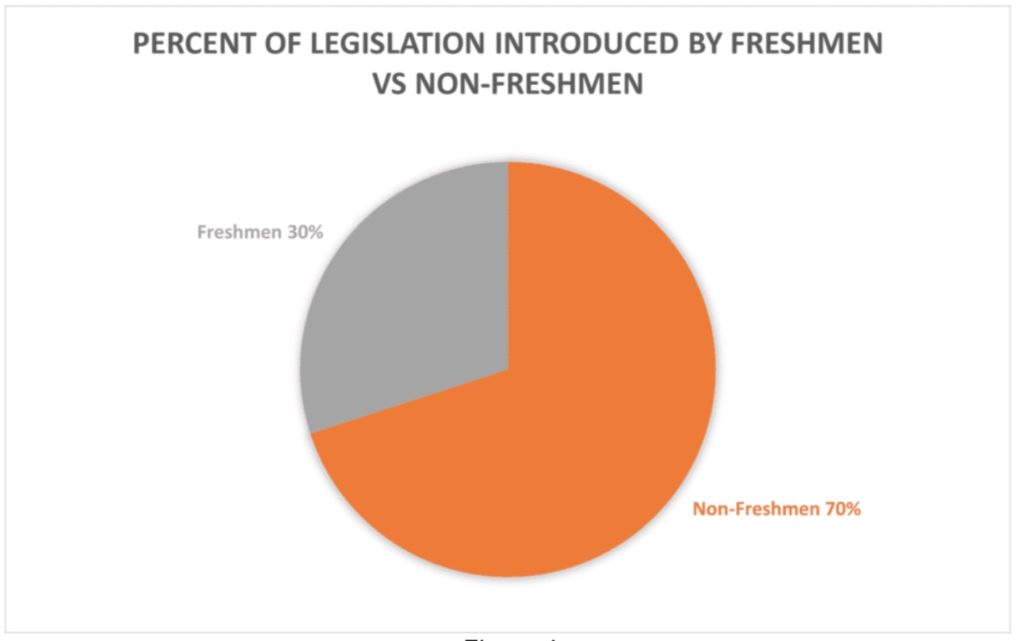
Following is a breakdown of how many bills were introduced by individual legislators within their respective chambers.
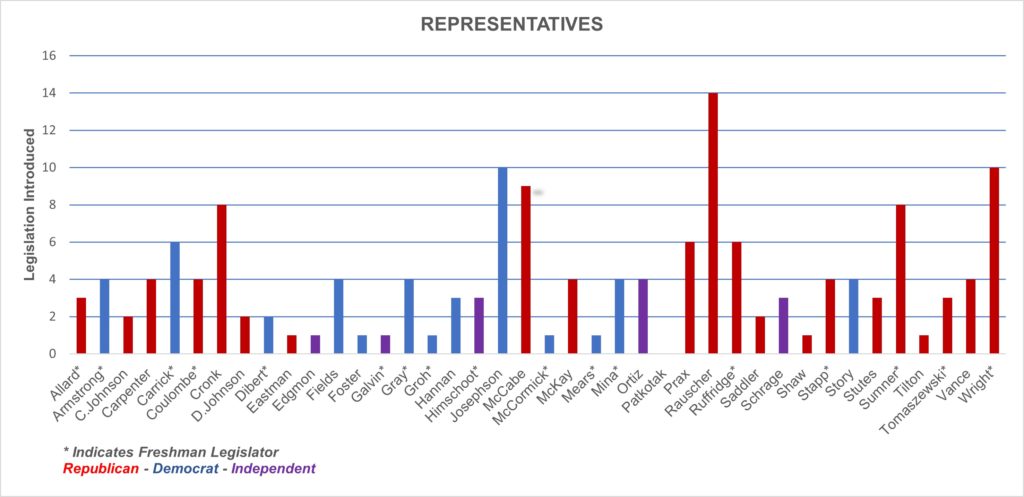
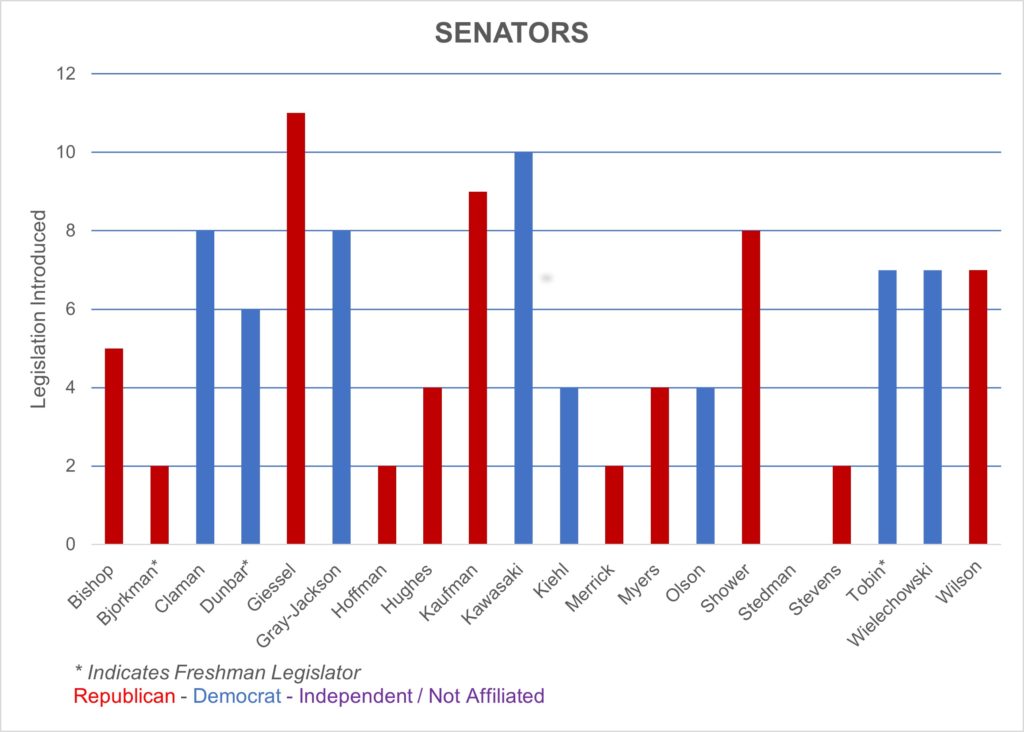
There is a great deal of work to be done before the legislature gavels in next January for the second session. Alaska Policy Forum is working every day to make the case for fiscal restraint and freedom with policymakers, and supporting it with top level research, policy papers, testimony and educational events, to execute our mission: to empower and educate Alaskans and policymakers by promoting policies that grow freedom for all.
Erick Cordero Giorgana, Bethany Marcum and Carmela Warfield are with Alaska Policy Forum, established in 2009.
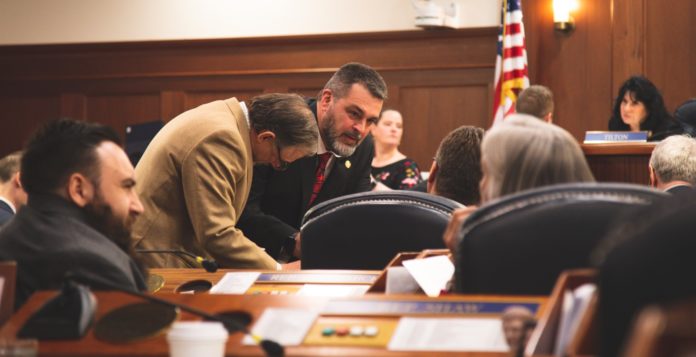
Now, let’s poll the public on the ethics of these so call hard working Assembly members! Me first!!!!!
They are all thieves and liars. They did work very hard to increase their bank accounts and power over the little guy.
Until they stop taking orders from the globalists and woke companies, nothing positive will come from our legislators. We need an Alaska First, America First mentality or it is a failure. Climate change is a farce, and they keep trying to tie our hands so we can’t tap the abundant resources of this State. We do not need more taxes, we need less. We do not need more laws and regulations; we need to free the people of the tyranny we are under. We are in an inflationary period and all they want is more to waste on their pet projects.
We will be lucky if we don’t end up in a depression at the rate the U.S. Congress is printing and devaluing our money. Banks are closing and soon you will be restricted as to how much you can pull from your account if at all. Many people do not understand how serious this is. Our economy is now a deck of cards that could collapse any day. We prioritize a war we shouldn’t be involved with and ignore our southern border as millions of illegal invaders cross it. We currently are not a free nation; we have been infiltrated by people that have no love for America or your families. They ignore the Constitution and turn their backs on the oath to defend it. They want you to be a compliant puppet that blindly follows their fake narratives and decrees. Keep praying and keep fighting folks, America is hanging off a cliff. We better pull it back fast!
Technically, the ‘House of Cards’ is subject to collapse; the ‘deck is stacked’ and subject to the least fun card game known as ’52 card pickup.’ 🙂
Since when did Gray-Jackson become a Republican? I always thought she took the lead in the gay parade when she was on the Anchorage Assembly. If she is a true Republican I need to switch parties!
Thanks for the update but I’m not impressed by anything this legislature, as a whole, has done!!?
The largest accomplishment of this past legislative session lay in it demonstrating, definitively and unquestioningly, what a farce the so-called “two party system” is in Alaska, and how entrenched the statist UniParty really is.
And weirdly, don’t want to fix our broken elections….of course that would mean they wouldn’t be in office.
Great summary!
Michael Johnson has said it all the only thing I would add is a lot of cuss words.
Thanks for this excellent analysis.
These are bylaws for them. They disobey all corporate bylaws anyway. Why bother writing any more of them? The work is unnecessary and worthless.
Nice summary. a more moderate legislature got their work completed in 121 days. A big improvement over previous sessions
Good report. Thanks. The one thing I’d add is using bills passed as a way to evaluate a legislator is not always as important as bills stopped by a legislator’s no vote. That can be far more important.
The most radical left legislature in Alaska history, coupled with a moderate RINO Republican governor, will give us a lot of bad bills. More bills is not necessarily a good thing.
Comments are closed.